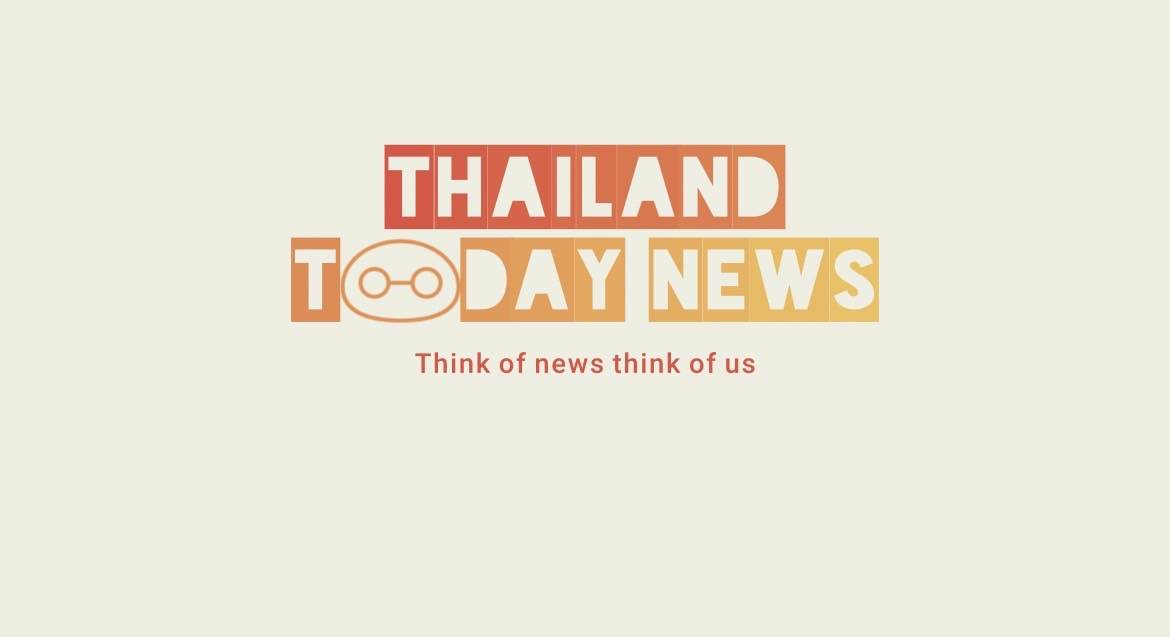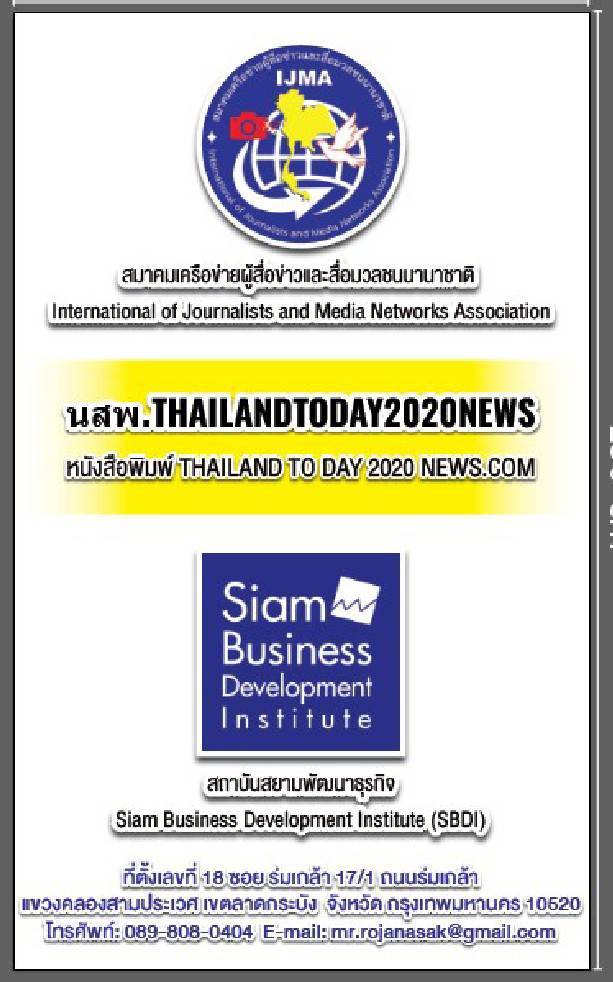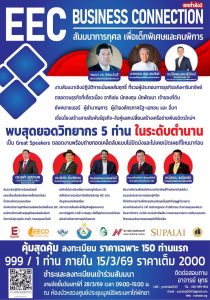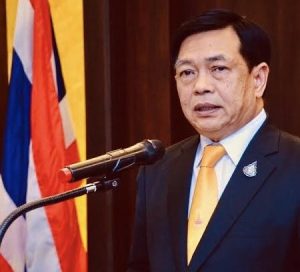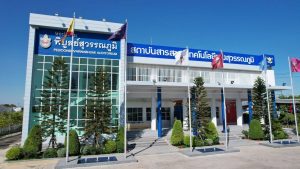
กลุ่มอิสลามิสต์กลุ่มกบฏในซีเรียโค่นผู้นำบาชาร์ อัล-อัสซาด ประธาธิบดีซีเรียคนปัจจุบัน สำเร็จ
กลุ่มกบฏในซีเรียเปิดเพลงและรุมเหยียบโปสเตอร์รูปหน้าผู้นำคนปัจจุบัน เพื่อฉลองที่สามารถเข้ายึดเมืองฮอมส์ ได้สำเร็จ ซึ่งเป็นชัยชนะครั้งใหญ่ หลังจากกลุ่มกบฏเดินทัพยึดไปแล้วหลายเมืองก่อนหน้านี้ ซึ่งรวมถึงเมืองอเลปโป และเมืองฮามา
นอกจากนี้กลุ่มผู้ประท้วงในชานกรุงดามัสกัสของซีเรีย ช่วยกันโค่นรูปปั้นของ ฮาเฟซ อัล-อัสซาด อดีตประธานาธิบดีผู้ล่วงลับ และบิดาของบาชาร์ อัล-อัสซาด ประธาธิบดีซีเรียคนปัจจุบัน ท่ามกลางเสียงโห่ร้องและปรบมือ โดยผู้ประท้วงเรียกร้องให้โค่นล้มผู้นำคนปัจจุบัน และเรียกร้องให้เจ้าหน้าที่ความมั่นคงอพยพออกจากพื้นที่
ผู้นำซีเรียหนีออกนอกประเทศหลังกลุ่มกบฏรุกคืบเมืองหลวง
สำนักข่าวรอยเตอร์สรายงานอ้างเจ้าหน้าที่ระดับสูงซีเรียว่า บาชาร์ อัล-อัสซาด เดินทางออกจากกรุงดามัสกัสโดยเครื่องบิน แต่ยังไม่ทราบจุดหมายปลายทางแน่ชัด ขณะที่กลุ่มสังเกตการณ์สิทธิมนุษยชนซีเรีย หรือ เอสโอเอชอาร์ ระบุว่า ผู้นำซีเรียหลบหนีออกจากประเทศแล้ว
ขณะที่แหล่งข่าวด้านการทูต เปิดเผยว่า เจ้าหน้าที่ของสถานเอกอัครราชทูตอิรักในซีเรีย ได้อพยพออกจากกรุงดามัสกัสไปยังเลบานอนแล้ว หลังจากสถานการณ์ตึงเครียดมากขึ้น เช่นเดียวกับเจ้าหน้าที่สถานเอกอัครราชทูตอิหร่านที่ได้อพยพออกจากกรุงดามัสกัสเพื่อความปลอดภัย ก่อนที่จะมีรายงานการโจมตีสถานทูตโดยบุคคลไม่ทราบฝ่าย
ขณะที่หลายชาติออกมาแสดงความกังวลถึงสถานการณ์ที่เกิดขึ้นในซีเรีย ซึ่งรวมถึงกาตาร์และสหรัฐอาหรับเอมิเรตส์ รวมทั้งสหรัฐฯ ซึ่งทำเนียบขาว ระบุว่า โจ ไบเดน ประธานาธิบดีสหรัฐฯ กำลังติดตามพัฒนาการณ์ของสถานการณ์ที่เกิดขึ้นนี้
โจ ไบเดน ประธานาธิบดีสหรัฐอเมริกา กล่าวถึงสถานการณ์ในซีเรีย ว่า บาชาร์ อัล-อัสซาด อดีตประธานาธิบดีซีเรียจะต้องรับผิดชอบกับการกระทำที่ผ่านมา ขณะเดียวกันสหรัฐฯ พร้อมจะสนับสนุนประเทศข้างเคียงของซีเรียในระหว่างช่วงเปลี่ยนถ่ายอำนาจ เพื่อป้องกันความเสี่ยงต่างๆ ที่อาจเกิดขึ้น รวมถึงการกลับมาเคลื่อนไหวของกลุ่มรัฐอิสลาม หรือ ไอเอส ขณะเดียวกัน สหรัฐฯ ยังไม่ยกเลิกหมายจับ อาบู โมฮัมเหม็ด อาล-จอลานี ผู้นำกลุ่มฮายาต ตาห์รีร์ อาล-ชาม หรือ HTS ซึ่งเป็นหนึ่งในกลุ่มต่อต้านที่นำทัพกบฏโค่นล้มรัฐบาลซีเรีย หลังจากที่ อาล-จอลานี ถูกตั้งค่าหัวโดยทางการสหรัฐฯ ตั้งแต่ปี 2013 เป็นเงิน 10 ล้านดอลลาร์สหรัฐ หรือราว 330 ล้านบาท เนื่องจากมีส่วนในการก่อการร้ายและสังหารประชาชนในช่วงก่อนหน้านี้
ส่วนสถานการณ์บริเวณชายแดนซีเรียฝั่งที่ติดกับอิสราเอล มีรายงานว่า รถถังและรถหุ้มเกราะของกองทัพอิสราเอลเคลื่อนกำลังผ่านรั้วกั้นชายแดนของทั้ง 2 ประเทศ ตั้งแต่ช่วงคืนวันที่ 8 ธ.ค.ที่ผ่านมาตามเวลาท้องถิ่น และประจำการอยู่บริเวณเขตกันชนในที่ราบสูงโกลัน รถหุ้มเกราะของกองทัพอิสราเอล เคลื่อนกำลังผ่านรั้วกั้นชายแดนซีเรีย เมื่อวันที่ 8 ธ.ค.2024 และประจำการบริเวณเขตที่ราบสูงโกลัน
ขณะเดียวกันมีรายงานเหตุระเบิดที่คาดว่าเป็นการโจมตีทางอากาศ เกิดขึ้นหลายครั้งภายในกรุงดามัสกัสของซีเรีย โดยไม่ทราบว่าเป็นฝีมือของฝ่ายใด แต่กองทัพอิสราเอลยังไม่ได้ให้ความเห็นในเรื่องนี้
ความพ่ายแพ้ของกองกำลังฝ่ายรัฐบาลซีเรีย สร้างความประหลาดใจอย่างมากต่อพันธมิตรสำคัญอย่างอิหร่าน โดยรัฐมนตรีต่างประเทศอิหร่านให้สัมภาษณ์กับสื่อว่า อิหร่านติดตามสถานการณ์มาโดยตลอด แต่ไม่คาดคิดว่ากองทัพซีเรียจะไม่สามารถต้านทานกลุ่มต่อต้านได้ ขณะเดียวกันรัฐบาลซีเรียไม่ได้ร้องขอความช่วยเหลือจากอิหร่าน
เปิด 5 เหตุผลทำไมสงครามซีเรียยากจะยุติ
1.ผลประโยชน์ของต่างชาติ
เมื่อความขัดแย้งหยั่งรากลงลึกขึ้น องค์กรจีฮัดหัวรุนแรง เช่น กลุ่มรัฐอิสลาม (ไอเอส) และกลุ่มอัลกออิดะห์ (Al Qaeda) ได้เข้ามาร่วมวงการสู้รบด้วย ขณะเดียวกันชาวเคิร์ดในซีเรียซึ่งต้องการปกครองตนเองและได้รับการสนับสนุนจากสหรัฐฯ ก็เพิ่มความซับซ้อนเข้าไปอีก ทางด้านรัสเซียและอิหร่านได้เข้ามามีบทบาทสำคัญในการรักษาอำนาจของประธานาธิบดีอัสซาด ส่วนทางด้านตุรกีได้สนับสนุนกลุ่มกบฏเพื่อปกป้องชายแดนทางตอนเหนือของตัวเอง “ระบอบของอัสซาดพึ่งพาการสนับสนุนจากต่างประเทศอย่างหนัก และประสบความสำเร็จอย่างมากในช่วงหลายปีที่ผ่านมา แต่การล่มสลายครั้งใหญ่ของฮิซบอลเลาะห์จากการโจมตีที่รุนแรงของอิสราเอล และการที่ทรัพยากรของรัสเซียถูกเบี่ยงเบนออกไป เนื่องจากสงครามในยูเครน ทำให้รัฐบาลอัสซาดยืนอยู่อย่างโดดเดี่ยว นั่นเป็นจังหวะที่ทำให้ขบวนการฮายัต ทาห์รีร์ อัล-ชาม (HTS) สามารถเปิดการโจมตีที่ไม่คาดคิดและเริ่มยึดพื้นที่กลับคืนมา” ดร.ไซมอน แฟรนเคิล แพรตต์ อาจารย์อาวุโสจากสาขาวิชารัฐศาสตร์ มหาวิทยาลัยเมลเบิร์น กล่าว
2. เศรษฐกิจล่มสลายและวิกฤตมนุษยธรรม
สงครามที่ยาวนานหลายปีได้สร้างความเสียหายให้กับซีเรียอย่างหนัก ทำลายเศรษฐกิจและโครงสร้างพื้นฐาน ส่งผลให้ประชาชนหลายล้านคนต้องเผชิญกับชีวิตที่ยากลำบาก สิ่งเหล่านี้นำไปสู่วิกฤตทางด้านมนุษยธรรมที่ไม่มีแผนการฟื้นฟูที่ชัดเจน “สถานการณ์ยังคงไม่แน่นอนและพลิกไปมาได้ตลอดเวลา” เอ็มมานูเอล อิช ผู้อำนวยการฝ่ายตอบสนองของขององค์กรเวิลด์ วิชัน ซีเรีย (World Vision Syria) กล่าว “มีการต่อสู้เกิดขึ้นในหลายพื้นที่ ซึ่งทำให้จำนวนผู้พลัดถิ่นภายในประเทศเพิ่มขึ้น” ก่อนที่การสู้รบครั้งล่าสุดจะเกิดขึ้น มีผู้คนในซีเรียจำนวน 15.3 ล้านคน ที่ต้องการความช่วยเหลือด้านมนุษยธรรม ซึ่งเป็นจำนวนสูงสุดในประวัติศาสตร์ และมีคนอีก 12 ล้านคน ต้องเผชิญกับปัญหาความไม่มั่นคงทางอาหารอย่างรุนแรง เหตุแผ่นดินไหวที่เกิดในเดือน ก.พ. 2023 ใกล้เมืองกาซีอันเท็พ ประเทศตุรกี ทำให้สถานการณ์ยิ่งแย่ลงไปอีก เพราะมีผู้เสียชีวิตจากเหตุแผ่นดินไหวมากกว่า 5,900 คนในซีเรีย และส่งผลกระทบต่อผู้คนราว 8.8 ล้านคน
ผลประโยชน์ทางเศรษฐกิจ เช่น การควบคุมแหล่งน้ำมันและเส้นทางการค้าสำคัญ ยังคงเป็นสาเหตุที่กระตุ้นความตึงเครียด และเมื่อรวมกับวิกฤตทางด้านมนุษยธรรม ก็ทำให้เกิดความไม่พอใจและการต่อสู้ภายในประเทศ
3. การปกครองแบบเผด็จการ
ระบอบของอัสซาดซึ่งพึ่งพาการใช้ความรุนแรงและการปราบปรามกดขี่เพื่อรักษาอำนาจของตนไว้ ได้กระตุ้นให้เกิดความไม่พอใจและความขัดแย้งที่ยืดเยื้อยาวนาน “การปกครองแบบเผด็จการ คือหัวใจของสงครามนี้” จูเลียน บาร์นส์-เดซีย์ ผู้อำนวยการกิจการความสัมพันธ์ระหว่างประเทศ ส่วนงานตะวันออกกลางและแอฟริกาเหนือของคณะมนตรียุโรป (European Council) กล่าว “ระบอบอัสซาดปฏิเสธที่จะประนีประนอมหรือแบ่งปันอำนาจอย่างต่อเนื่อง”
บูร์ซู โอซเชลิก นักวิจัยอาวุโสด้านความมั่นคงในตะวันออกกลาง จากสถาบันการวิจัยทางการทหารแห่งสหราชอาณาจักร (Royal United Services Institute) ซึ่งเป็นหน่วยงานวิชาการด้านความมั่นคงและการป้องกันประเทศ กล่าวเสริมว่า “ระบอบการปกครอง (ของอัสซาด) มุ่งเน้นไปที่การอยู่รอดมากกว่าการปกครองที่มีธรรมาภิบาลที่ดี”
4. สังคมที่แบ่งฝักแบ่งฝ่าย
พื้นที่ทางตะวันออก ซึ่งประชากรส่วนใหญ่เป็นชาวเคิร์ด ยังคงอยู่นอกการควบคุมของรัฐบาลซีเรียนับตั้งแต่ปีแรก ๆ ของสงคราม ขณะเดียวกันกลุ่มต่าง ๆ ของกลุ่มรัฐอิสลาม (ไอเอส) ยังคงอยู่ในทะเลทรายซีเรียอันกว้างใหญ่ ซึ่งเป็นภัยคุกคามด้านความมั่นคง ส่วนทางภาคตะวันตกเฉียงเหนือ จังหวัดอิลิบได้กลายมาเป็นฐานที่มั่นของกลุ่มกบฏที่ถูกผลักดันไปยังพื้นที่ดังกล่าวในช่วงที่สงครามถึงจุดรุนแรงที่สุด และกลุ่มกบฏที่ผู้นำของกองกำลังเหล่านี้ คือฮายัต ทาห์รีร์ อัล-ชาม (HTS) ซึ่งถือเป็นผู้ปกครองในทางพฤตินัยของจังหวัดดังกล่าว
สถานการณ์ยิ่งซับซ้อนขึ้นจากการปะทะกันภายในระหว่างกลุ่มกบฏบางกลุ่ม รวมถึงกลุ่มที่ได้รับการหนุนหลังจากตุรกีที่ปะทะกับกองกำลังประชาธิปไตยซีเรีย (SDF) ซึ่งเป็นพันธมิตรที่ประกอบด้วยนักรบชาวเคิร์ดจากหน่วยป้องกันประชาชน (People’s Protection Units-YPG) โดยกลุ่มหลังนี้ตุรกีถือว่าเป็นองค์กรก่อการร้าย
ไม่นานหลังจากที่ฮายัต ทาห์รีร์ อัล-ชาม (HTS) เริ่มการโจมตี กองทัพปลดปล่อยซีเรีย (Free Syria Army)ที่ได้รับการสนับสนุนจากตุรกี ซึ่งเป็นส่วนหนึ่งของพันธมิตรกลุ่มกบฏที่ยึดอเลปโปมาได้ อ้างว่าพวกเขาได้ยึดพื้นที่และหมู่บ้านในชนบทโดยรอบเมืองเหล่านั้น ดินแดนเหล่านี้ไม่ได้ถูกควบคุมโดยรัฐบาลของบาชาร์ อัล-อัสซาด แต่เป็นของกองกำลังประชาธิปไตยซีเรีย (SDF) ซึ่งยิ่งสะท้อนถึงลักษณะของความขัดแย้งที่ซับซ้อนหลายแง่มุมและแตกแยกออกเป็นส่วน ๆ
5.การทูตระหว่างประเทศล้มเหลว
การเจรจาสันติภาพ ซึ่งรวมถึงการเจรจาที่นำโดยสหประชาชาติ ประสบกับความล้มเหลวเสียส่วนใหญ่ เนื่องจากวาระที่ขัดแย้งกันระหว่างคู่ขัดแย้ง ฝักฝ่ายหลัก ๆ มักจะให้ความสำคัญแก่เป้าหมายในทางยุทธศาสตร์ของตัวเองมากกว่าการประนีประนอม ทำให้หนทางของทางแก้ปัญหาที่ยั่งยืนหดแคบลง “พลวัตที่สำคัญและซ่อนอยู่ยังคงไม่เปลี่ยนแปลง กล่าวคือ ระบอบการปกครองของอัสซาดไม่เต็มใจที่จะสละอำนาจหรือประนีประนอม ในขณะที่กลุ่มกบฏต่าง ๆ ยังคงต่อสู้รบเพื่อขับไล่เขาออกไป และยังรักษาตำแหน่งแห่งที่ของพวกเขาเองในประเทศเอาไว้” บาร์นส์-เดซีย์ จากคณะมนตรีแห่งยุโรป กล่าว
ผู้เชี่ยวชาญบางคนยังเน้นย้ำถึงความคาดเดาไม่ได้ที่เกิดจากการเปลี่ยนแปลงนโยบายของสหรัฐฯ ภายใต้รัฐบาลของนายโดนัลด์ ทรัมป์ เช่น มีรายงานว่าตุรกีสนับสนุนการโจมตีของกบฏเมื่อไม่นานมานี้ เพื่อเสริมความแข็งแกร่งให้กับสถานะของตน ก่อนการเข้ารับตำแหน่งของทรัมป์ โดยแสวงหาการเจรจาที่เป็นประโยชน์กับสหรัฐฯ และรัสเซีย อย่างไรก็ตาม ตามการให้ความเห็นของบาร์นส์-เดซีย์ เขามองว่ายุทธศาสตร์เกี่ยวกับตะวันออกกลางภายใต้การบริหารของทรัมป์ยังคงไม่ชัดเจน นโยบายในตะวันออกกลางที่แข็งกร้าว ไม่ว่าจะเป็นการสนับสนุนอิสราเอล และต่อต้านอิหร่าน และมีอีกฝ่ายหนึ่งที่สนับสนุนแนวทางการโดดเดี่ยวตัวเองและถอนตัวออกไป ยังคงมีความไม่แน่นอน


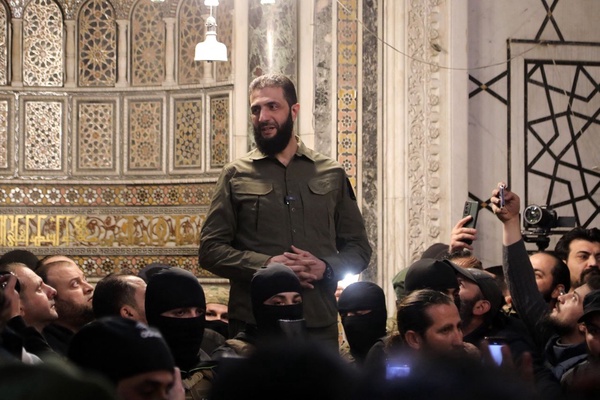
The rebel Islamic group in Syria successfully defeated the current Syrian leader Bashar al-Assad.
Syria’s rebels played music and trampled on posters in front of the current leader to celebrate their successful takeover of Homs, a major victory after the rebels had previously captured several cities, including Aleppo and Hama.
In addition, demonstrators in Syria’s Damascus suburbs helped to overthrow the statue of the late former president Hafez al-Assad and the father of present-day Syrian president Bashar al-Assad amid shouts and applause by protesters calling for the overthrow of the current leader and for the evacuation of security forces.
The Syrian leader fled the country after rebels advanced to the capital.
The Reuters reported quoting a high-ranking Syrian official that Bashar al-Assad left Damascus by plane but the destination was not yet known, while the Syrian Human Rights Watch, or SOHR, said the Syrian leader had fled the country.
Meanwhile, diplomatic sources said Iraqi Embassy officials in Syria had already evacuated Damascus to Lebanon after the situation became more tense, as did Iranian Embassy officials who had evacuated Damascus for security purposes before reports of an unidentified attack on the embassy.
While many nations expressed concern about the situation in Syria, including Qatar and the United Arab Emirates and the United States, the White House said U.S. President Joe Biden is monitoring the development of the situation.
Speaking on the situation in Syria, U.S. President Joe Biden said former Syrian President Bashar al-Assad will be responsible for past actions. The U.S. is ready to support Syria’s neighboring countries during the transition to prevent potential risks, including the resumption of Islamic State (IS) movement. The arrest warrant for Abu Mohammed Al-Jolani, leader of the Hayat Tahrir Al-Sham group, or HTS, one of the rebels who led the Syrian government after Al-Jolani was fined 10 million U.S. dollars or about 330 million baht by the U.S. authorities since 2013, for his involvement in terrorism and killing people earlier.
As for the situation on the Syrian border with Israel, Israeli tanks and armored vehicles have reportedly moved past border barriers between the two countries since the night of December 8. C. Past local time and stationed in the buffer zone in the Golan Heights. Israeli military armored vehicles moved past the Syrian border fence on December 8. A.D. 2024 and stationed in the Golan Heights area.
At the same time, several suspected air strikes have been reported within Damascus, Syria, without knowing which side it was on, but the Israeli military has yet to comment on the matter.
The defeat of Syrian government forces came as a great surprise to Iran’s key ally. The Iranian foreign minister told the media that Iran has been monitoring the situation, but he did not expect the Syrian army to be unable to resist resistance. At the same time, the Syrian government did not ask for help from Iran.
Five reasons. Why was the Syrian War so hard to end?
1. Foreign interests
As the conflict deepens, extremist Jihad organizations such as the Islamic State (IS) and Al Qaeda also join the fray. Meanwhile, the Kurds of Syria, who want to govern themselves and support the U.S., are increasingly complicated. Russia and Iran have played a key role in preserving President Assad’s power. Turkey has supported rebels to defend its northern border. “Asad’s regime relies heavily on foreign support and has achieved great success over the years. But Hezbollah’s great collapse from Israeli attacks and Russia’s resources were diverted due to the war in Ukraine. This allowed the government of Assad to stand alone. That was the moment that allowed the Hayat Tahrir al-Sham movement to launch an unexpected attack and begin to recapture the area.” Simon Frankel Pratt, a senior lecturer at political science at the University of Melbourne, said.
2. The economy collapsed and the humanitarian crisis.
Years of war have devastated Syria, destroyed its economy and infrastructure, put millions of people in difficult lives. These have led to humanitarian crises that have no concrete recovery plan. “The situation remains unstable and always turns around.” Emmanuel Ish, responsiveness director for the World Vision organization. Vision Syria) said, “There have been fighting in many areas, increasing the number of internally displaced people.” Before the latest battle, 15.3 million people in Syria needed humanitarian assistance, the highest number in history, and 12 million more faced serious food insecurity. 2023 near Ghaziantep, Turkey, aggravated the situation because more than 5,900 people died in Syria and affected about 8.8 million people.
Economic interests, such as control of oil fields and major trade routes, continue to be a cause of tension, and combined with the humanitarian crisis, create discontent and internal strife.
3. tyranny
Assad’s regime, which relies on violence and repression to retain its power, has provoked long-lasting resentment and conflict. “Authority is the heart of this war,” said Julian Barnes-Daisy, Director of International Relations for the Middle East and North Africa section of the European Council. “The Assad regime has consistently refused to compromise or share power.”
“The regime (of Assad) focuses on survival rather than good governance,” said Bursu Ozchelik, senior researcher of Middle East security at the Royal United Services Institute, the academic body of security and national defense.
4. a divided society
The eastern area, where the majority of the population is Kurdish, has remained out of control of the Syrian government since the early years of the war. Meanwhile, groups of Islamic State (IS) remain in the vast Syrian desert, threatening security in the northwest. The province of Ilib has become a stronghold of rebels who were pushed to the area during the war’s most violent period. And the rebel group whose leader is Hayat Tahrir al-Sham (HTS), who is the de facto ruler of the province.
The situation is complicated by internal clashes between some rebel groups, including those backed by Turkey’s clash with Syrian Democratic Forces (SDF), an alliance of Kurdish fighters from the People’s Protection Units (YPG). Turkey considers the latter a terrorist organization.
Shortly after Hayat Tahrir al-Sham (HTS) launched an attack on the Turkish-backed Free Syria Army, part of the rebel alliance that captured Aleppoma, claiming that they had taken over rural areas and villages around them. These territories were not controlled by the government of Bashar al-Assad but by the Syrian Democratic Forces (SDF). This is even more reflective of the nature of the conflict that is complex in many aspects and fragmented.
5. International diplomacy has failed.
Peace talks, which include U.N.-led talks, have largely failed because conflicting agendas between the main opposition parties often place more emphasis on their strategic goals than compromise, narrowing the path to a sustainable solution. “The key and hidden dynamics remain unchanged, namely: Assad’s regime is reluctant to relinquish power or compromise while rebels continue to fight to expel him and maintain their own position in the country,” said Barnes-Daisy of the Council of Europe.
Some experts also stress the unpredictability caused by U.S. policy changes under the Donald Trump administration, such as how Turkey recently supported the rebel attack to strengthen its position before Trump’s inauguration, seeking useful talks with the U.S. and Russia. According to Barnes-Dacey’s comments, the strategy on the Middle East under the Trump administration remains unclear. Strong Middle East policies, whether pro-Israel and anti-Iran, and others supporting isolationism and withdrawal, remain uncertain.


